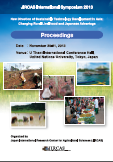Regional Food Resource Network

More than thousands of local food resources including indigenous plants, animals, insects and traditional
fermented foods have been consumed in Asian countries for a long time. Some are collected from nature,
or produced in small scale home gardens. Most area-specific fermented foods are not distributed to other
places. Recent studies have indicated that those regional food resources have a high potential to be a
source of health functional components and useful microoganisms. And, there will be some hints in the
traditional way of food processing to develop new processed foods that are different in style from
conventional ones. At the same time, among the components of regional foods made from indigenous
materials, or metabolites of unique microorganisms, there would be novel effective functional compounds
and useful enzymes.
Based on these backgrounds, JIRCAS together with its Asian counterpart organizations agreed to
launch the ‘Food Research Network of Asia,’ for the efficient utilization of indigenous food resources.
Members of the network started to keep close communications and shared their knowledge on major
issues concerning food research, particularly food processing technology and physiological functionality
of traditional food resources. Through the annual meetings in 2011 (at Bangkok) and 2012 (at Zhengzhou,
China), it was discussed how to extend the activities of the network private sectors of each country. As an
activity of the network, databases on indigenous foods of each region of Asia is now being constructed.
The databases will be uploaded under the network homepage.
At the same time, JIRCAS will implement extensive projects (Advanced Application of Local Food
Resources in Asia), re-evaluate previous empirical data, bearing in mind that our research outputs will be
used in industries. A group of researchers from JIRCAS, Kasetsart University (Thailand) and Laos
University elucidated the regional differences and time-dependent transition of bacterial and fungal
species (e.g. lactic acid bacteria) living in fermented fish, which were produced in Indochina by analyzing
DNA via denaturing gradient gel electrophoresis (DGGE) method. On the subject of food processing,
researchers from JIRCAS and China Agricultural University developed a new and efficient coagulant
agent to produce Chinese-style tofu. Electron spectroscopic characterization of sticky rice from Japan and
Thailand was carried out to understand the properties of water-soluble polysaccharides, which are expected
to be used for various food processing techniques.
| 刊行年月日 | |
|---|---|
| 作成者 | Kazuhiko Nakahara |
| 著者キーワード |
regional food resources local food traditional food fermented food |
| 公開者 | Japan International Research Center for Agricultural Sciences |
| オンライン掲載日 | |
| 号 | 2013 |
| 開始ページ | 201 |
| 終了ページ | 207 |
| 権利 | Japan International Research Center for Agricultural Sciences |
| 言語 | eng |
